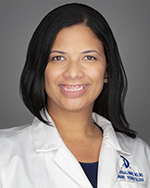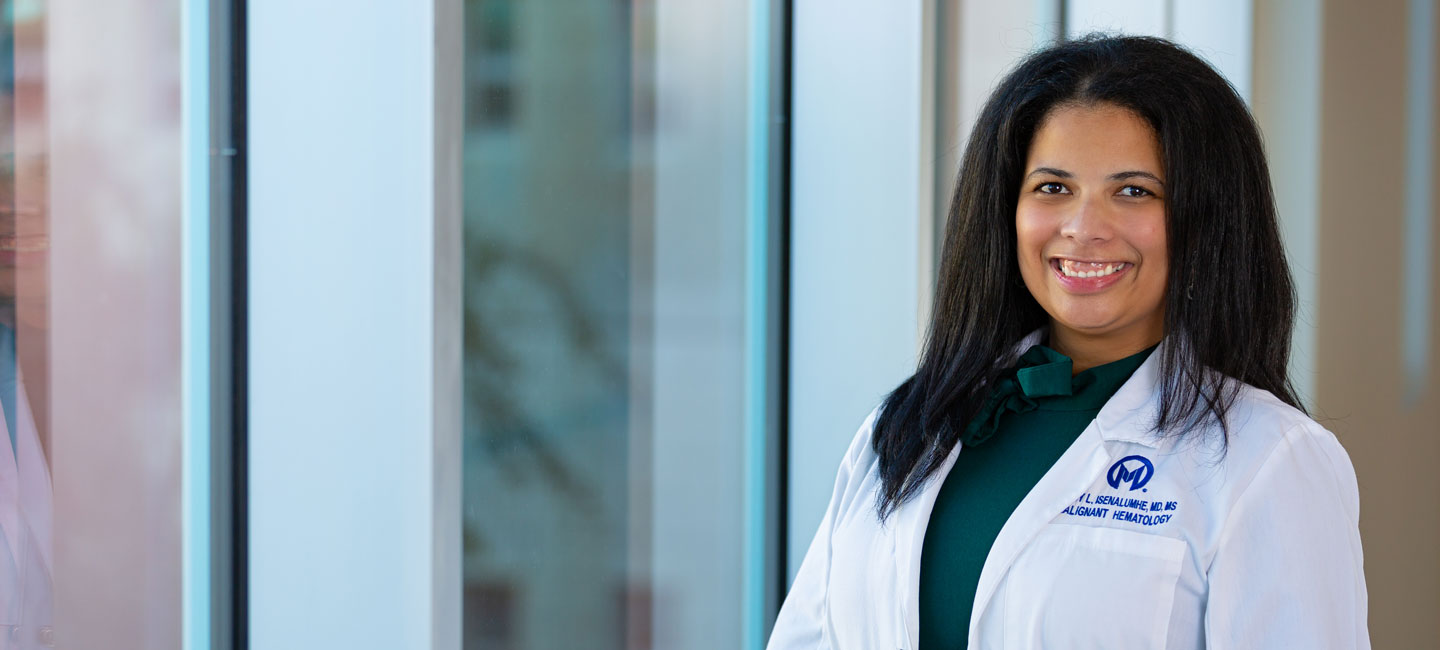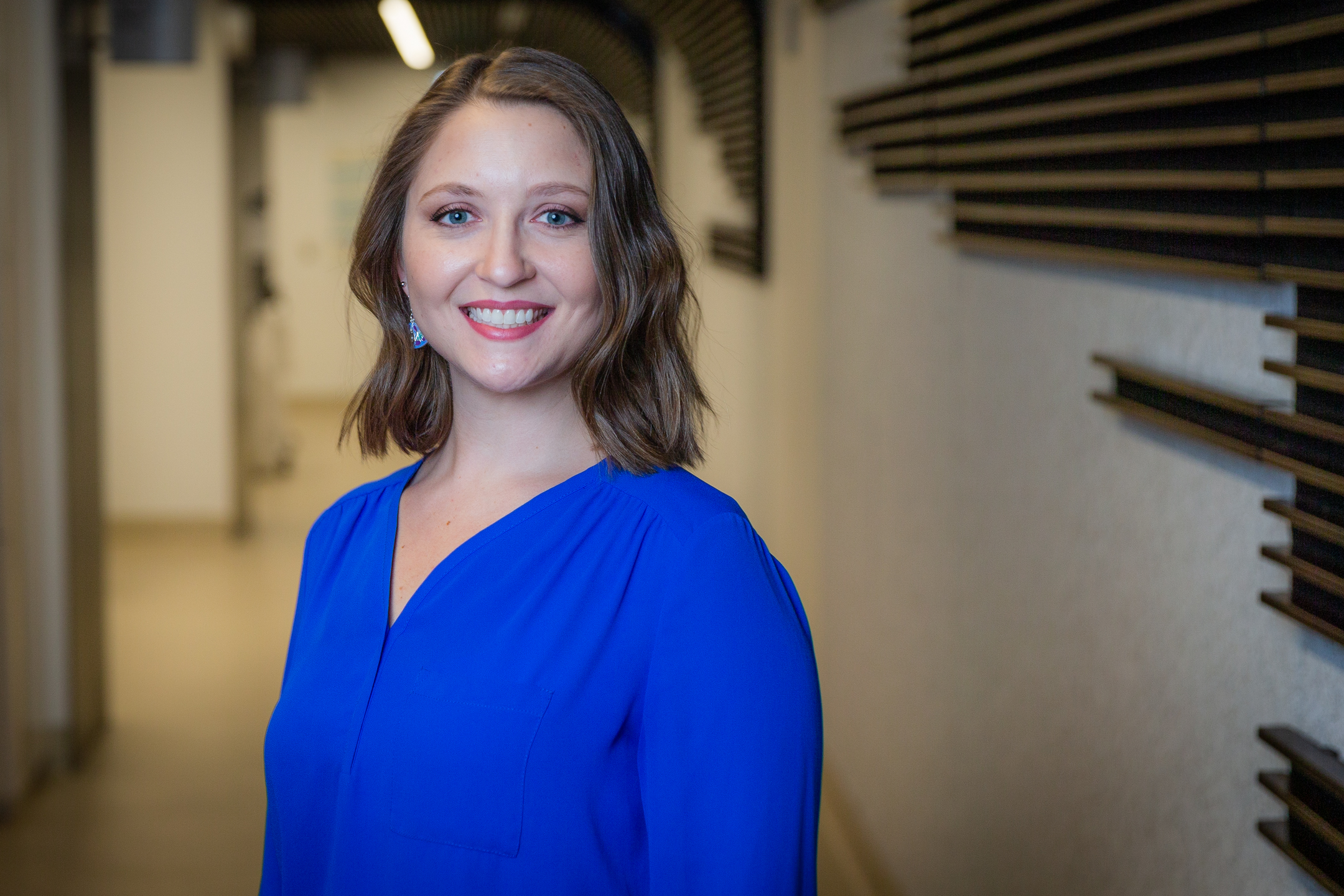Hematologist Focuses on Young Adult Population
Leidy Isenalumhe, MD, MS, has been an assistant member of the Department of Malignant Hematology at Moffitt Cancer Center since 2018. Uniquely trained in both pediatric and adult hematology-oncology, her clinical focus is in malignant hematology. She emigrated from the Dominican Republic when she was 8 and her identity as a Latina has shaped her approach to medicine. This perspective has also fueled her research focus in malignant hematology, more specifically leukemia and lymphoma in the Adolescent and Young Adult population. She loves speaking Spanish with her patients, enjoys a very tidy office and adores her two daughters, both under 2.
Did you always want to go into medicine and oncology?
I did! I always knew I wanted to be a doctor. When I was in medical school, I always ended up rotating through the hematology oncology practices and ironically with residents that were training in combined internal medicine-pediatrics. I simply loved it. It just made sense for me. I had to make my own path though. There weren’t really any combined internal medicine-pediatrics hematology-oncology programs at the time. I did consider another field in medicine though, endocrinology, but it didn’t feel as enticing to me as hematology oncology. With hematology oncology, I feel like I always want to read more. I love the complexity of it. I just knew the first day after my rotation with hematology oncology that this was what I wanted to do. I even called my now husband and told him back then, “This is it; this is what I’m going to do. I’m sure of it.”
Who was most influential in your career choices?
I got lucky to have someone by my side when I was very young that led me to that road. She was my high school teacher, who I still talk to! She was the one that said, “You know you can be a doctor; you can take it as far as you want to.” She plugged me into all these programs and kind of forced me into those opportunities. If I didn’t have her, I truly do believe that I wouldn’t have made it into medicine. She got me into research very early and because of her, I did lab research at NYU at only 16 years old. And yes, I was the only one like myself there, but because I was exposed to that, I thought to myself that even someone like me could go to a big-name school. It made that a reality for me. The fact that she pushed me to do that, I truly believe that I wouldn’t be here if it wasn’t for her.

Describe your clinical interests and how this work ultimately might benefit cancer patients.
The AYA population encompasses all races or ethnicities and is an underserved population. They are considered a group of patients with a lot of disparities. They’re not doing well compared to other ages. One of the causes was a lack of clinical trials in that field and a lack of standardization for treatment. For example, if you’re a 20-year-old and live close to a pediatric center, you’re more likely to receive a pediatric treatment regimen. However, if that same 20-year-old goes to an adult center, they’ll get treated by an adult regimen. There was no consistency. I think the difference in biology and looking at toxicities, which are my interests, are going to help gear the treatment regimens for those patients. That’s one of the ways we’ve been able to move this field forward. Using data, we’ve been able to determine which regimens are best for certain patients. It’s not as cookie-cutter though because an 18-year-old is not the same as a 35-year-old. It’s a large age range.
What did mentorship mean for you when you were starting your career?
I felt like I got very lucky. Most of the time, I had great mentorship. There were times when I didn’t. I can’t say it was perfect every time. What I liked about my mentors was just being able to be myself. I could state my fears and have them speak to those fears for me. Communication is so important. That’s the kind of mentorship I want to offer. I want to be able to say, here are articles you should be reading, I have these opportunities for you and this is what you need to be doing to find a job. I want to be able to have that conversation in an informal manner, without fear or judgement. My best mentors were the ones who listened to my wishes for my career. I want to provide the same.
What does inclusion mean to you?
To me, inclusion is when you can be your true core self, express your culture and unique personality and beliefs. Inclusion is when people are actively trying to include more people that look like me into their institution. I don’t want to be the only female Hispanic hematologist-oncologist. When I was going through training, there weren’t that many women of color or Latinas in medicine. I think Moffitt is the first place I’ve worked at where there are a lot of Hispanic women working as physicians. That made me feel more comfortable, included and valued. Nurturing and mentoring Hispanic medical students — I think that would be inclusion.
Do you feel it’s beneficial for women in medicine and research to have male allies?
When I had my first child, it was a male ally that reassured me that my career wouldn’t stop during maternity leave. He said, “I can guarantee you that we will help your career. You should not be ashamed to take time off with your children.” And he was right. It was refreshing. I had two children, I took time off and my career didn’t suffer. That’s a good example of male allyship. That support made a difference and made it easier for me to take time away from work. If you have male allies in your department like that, then the entire environment around your institution will be the same. I think it’s sad that we still need male allies, but I also think it’s important to have them because the field of medicine is still so heavily male. I think there might be other opportunities that you’re not aware of as a woman that a man could point you towards.
What is the best career advice you’ve received?
No one is going to care as much as you. You must do what you think is right and use your gut feeling to go for it. No one is ever going to petition for you as much as you will. You have to be the one to push for your ideas. And honestly, just remember to be yourself. If they don’t like you, you shouldn’t stay there. It’s not the place for you.
What do you do to unwind at the end of the day?
I have two children under 2. I don’t think I know what to do to unwind anymore! Before COVID-19, I worked out with a personal trainer and I’m hoping to get back to that. My husband and I also used to dance a lot. We try dancing with the kids. I also love going to church and praying.



